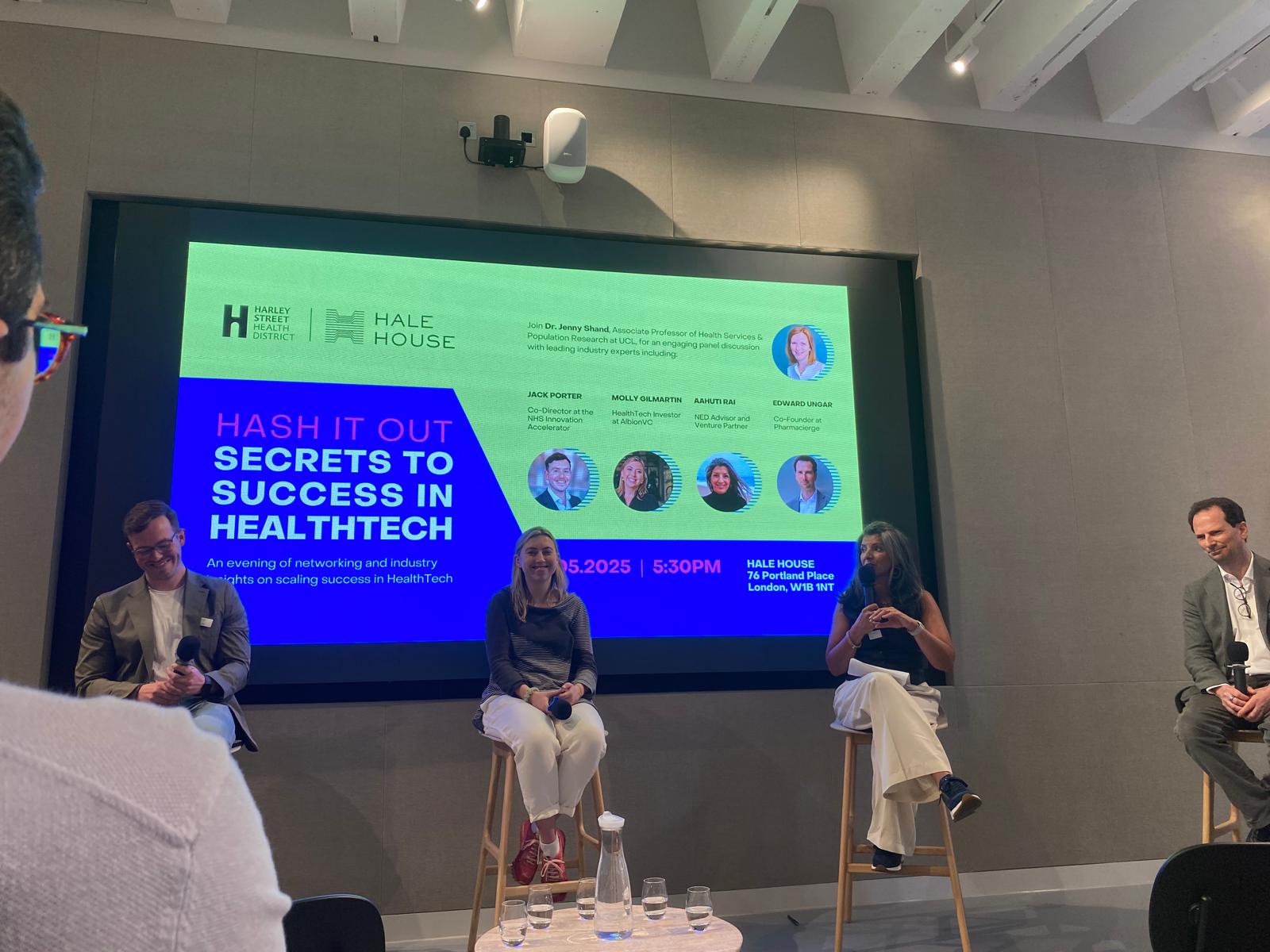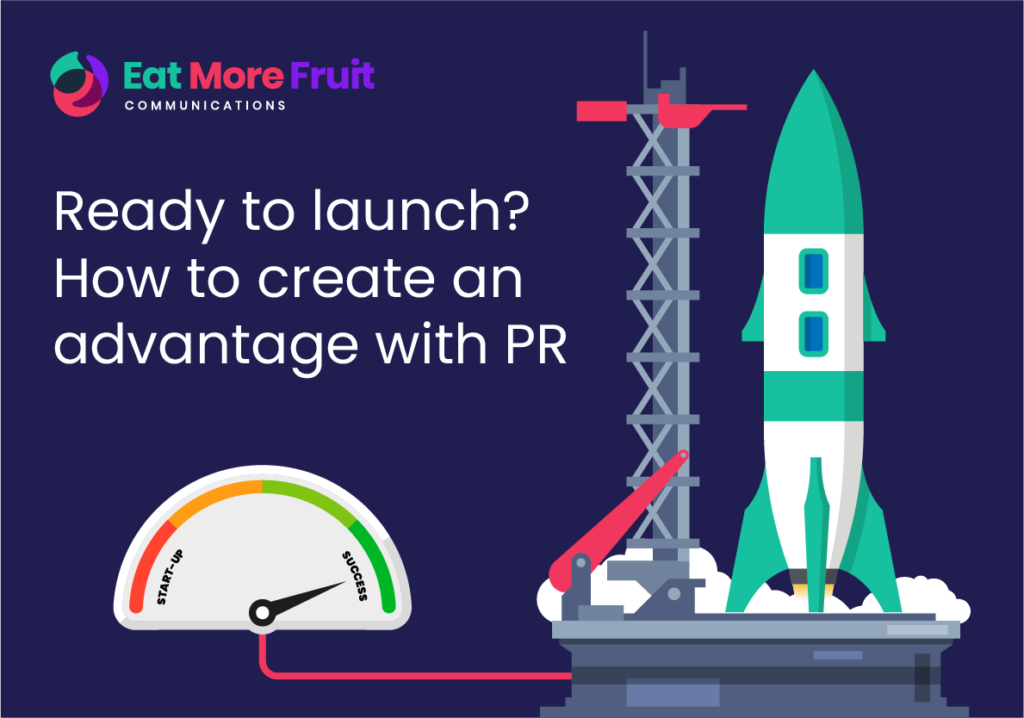Scaling in health tech needs more than a breakthrough product. It’s about communicating product-market fit, proving your value to early adopters and funders, and knowing how to tell your data story in a way that works across institutions, private, patient, and investor audiences. This is where health tech marketing comes into play, and getting those fundamental messages right.
This week, at Hale House’s inaugral “Hash It Out: Secrets to HealthTech Success” panel event, four health tech veterans spoke about what this means, and what distractions can get in the way of a focussed and efficient launch strategy.
Who was on the panel?
- Dr. Jenny Shand: Associate Professor in Health Services and Population Research at UCL
- Jack Porter: Co-Director at the NHS Innovation Accelerator
- Molly Gilmartin: HealthTech Investor at AlbionVC
- Aahuti Rai: NED Advisor & Venture Partner
- Edward Ungar: CEO & Co-Founder of Pharmacierge
After years of working with early-stage bio and health techs, from psychedelic-assisted addiction therapy (Awakn Life Sciences), to non-invasive biopsy imaging (Perspectum Diagnostics), to digital mental health (SilverCloud Health), we’ve seen the patterns. Hearing them echoed by the panel felt like validation. These aren’t just PR problems; they’re business challenges.
The marketing ideas that matter when you’re scaling:
1. Problem-Solution ≠ Product-Market Fit
Just because your product solves a real clinical or patient problem doesn’t mean it fits the way the market works. Adoption and reimbursement are different beasts. If nobody is willing to pay (yet), you need to shift the conversation in your favour.
2. Know your market, Bottom up, not Top down
Skip the slide about a billion-dollar global diabetes market. Instead, define the real people, in real systems, with real budgets who will adopt you first. Your first market matters more than your total addressable one. Stakeholder audits and the right advocates can help capture attention that proves the scalability.
3. Your messaging needs a spine
You get one sentence. One story. One core proposition. Without it, your campaign fragments and you burn time speaking to the wrong people.
4. Rinse-and-repeat doesn’t always work
What lands in the NHS won’t always land in the US. What works in one ICB may fail in another. You need comms and campaigns that flex by geography, care setting, and buyer without losing your core proposition.
5. Speak the system’s language
In the NHS, value = people. Instead of “we reduce clinical admin,” say “we save the equivalent of 1 GP per day.” In secondary care, show cross-department scale (“works in dermatology, gynaecology, orthopaedics”). Marketing = translation of your evidence to what they’re already thinking about.
6. Don’t overlook B2C, even if you’re not
VCs are warming to patient-focused products. Even if patients don’t pay, they influence choice. Early patient validation builds confidence for investors, partners, and pilot sites.
7. Evidence without a narrative won’t land
You can have brilliant pilot results but if nobody understands them or sees themselves in them, they won’t convert. Turn your data into stories. Segment your case studies. And prioritise quality over volume, making sure your heroes are amplified so the right people see them.
8. Marketing is part of your market entry strategy
The market won’t just “get it.” To enter new verticals or sectors, you need the right comms assets, visibility, and champions.
9. Make room for wild cards
Reserve 10% of your focus for unexpected bets; an unusual investor, a niche market, a corporate partner outside of health. Dolby invests in mental health. A Japanese car firm runs three health incubators. Keep bringing the outside in to find where your solution lands.
10. Prevention is a long play
From one of the panel speakers, “80% of innovation is happening in the 20% of healthcare that’s clinically focussed. There is a latent opportunity for health tech.” But as a fellow panel member said, prevention is hard to monetise.
But it’s shifting. Use connected data, ICBs, and real-world evidence to show indirect value.
So what does that mean for your marketing?
If you’re scaling a health tech company, here are three things to get right:
1. Your brand story must be clear from the start
Explaining your MOA and the problem you solve isn’t enough. If people can’t remember your story, they can’t share it or invest in it. There’s a defined process to condense your messaging so investors take notice, the media gets excited, and everyone remembers what you do. As a panellist said, problem–solution ≠ market fit. Make your fit clear and own it.
2. Bring your evidence to life across every channel
You have more data available to you than you think. Combine your clinical outcomes and pilot data with behavioural and psychometric insights from the biggest digital data sources available, with smart AI-augmented weighting to put a value on an anecdote.
Investors want to see robust evidence. But NHS buyers and patients need to feel confident in what the results mean for them. That means combining outcome data with behavioural, psychometric, and real-world usage insights to create a bigger picture.
One panellist summarised that proving the impact of preventative tech is notoriously difficult. You don’t need 100 pilots, you need clear, compelling evidence that’s easy to grasp and hard to ignore. And that’s not just academic publications, it could be early patient case studies. It’s creative, shareable, and story-led. It’s the foundation of a great early comms pack.
3. Prioritise your people
The NHS is a relationship-driven system. Investors rely on pattern recognition. Media love the human story. So who’s telling your story on your behalf?
Profiling the team is as important as profiling the tech. The human advocacy, whether from clinicians, early adopters, or industry champions, creates trust.
And with media? Every TechCrunch journalist wants to be the first to cover the next big sector-shaping company. But they need the story, and the proof, and the personality.
So what next for health tech marketing?
Scaling in health tech takes grit, evidence, and timing. But also storytelling, clarity, and human connection. If the people who matter don’t understand your value, or don’t see themselves in your vision, you’re making growth harder than it needs to be.
Our Scale-Up PR Accelerator is built to help health tech scale-ups close that gap. Over 24 months, we help founders go from noise to narrative:
✔️ A clear and memorable brand story
✔️ A compelling evidence-led story
✔️ The media visibility and relationships with momentum
If that’s what you’re building toward, we should talk.





